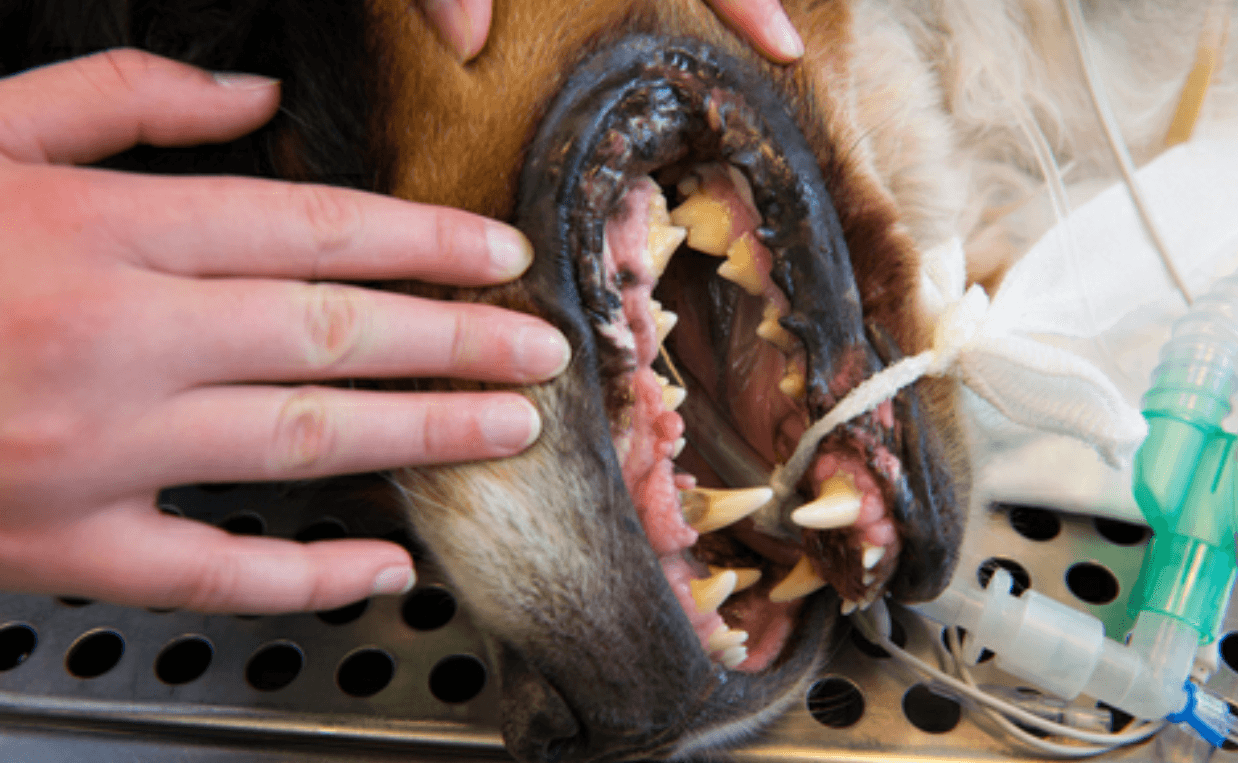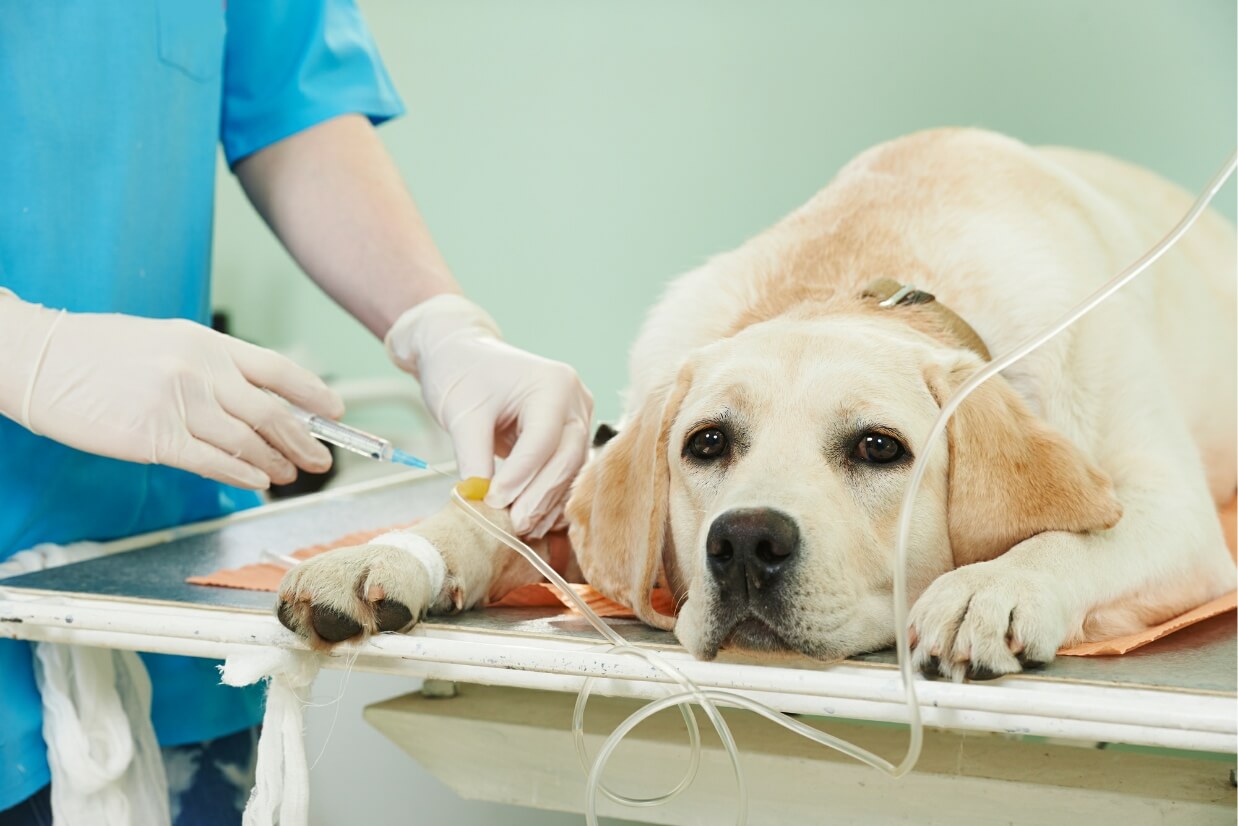
As a dog owner, at one point or another you have probably heard of chronic kidney disease, also referred to as “renal failure”. Kidney disease is the third most common cause of death in dogs and tends to become more common as your dog ages.
Just like human kidneys, canine kidneys balance certain substances in the blood and filter out the body’s wastes as urine. The kidneys maintain a certain balance of salt and water in the body. They also help control blood pressure, aid in calcium metabolism and sustain phosphorous levels. They also manufacture a hormone that helps facilitate red-blood cell production. When kidneys don’t function properly, toxins build up in the blood and the dog will become ill.

Canine Kidney Disease Causes
There are two types of kidney diseases in dogs: acute and chronic. Acute kidney failure occurs abruptly over a matter of days.
Common causes of acute kidney failure include:
- Ingesting toxins, such as antifreeze or medications
- Tainted food
- Decreased blood flow or oxygen to the kidneys
- Infections
- Urinary obstruction
While some kidney issues have an immediate cause and can be treated, chronic kidney disease comes on slowly and the cause is harder to determine. Chronic kidney disease affects mostly older dogs and is often caused by underlying illness, congenital and hereditary conditions.
Surprisingly, a common cause of chronic kidney disease in dogs is dental disease. Bacteria associated with advanced dental disease enter the bloodstream and cause irreversible damage to the heart, liver and kidneys.

Canine Kidney Disease Signs and Symptoms
Common signs and symptoms of kidney disease in dogs includes:
- Increased water consumption and urination
- Incontinence, especially at night
- Vomiting and/or diarrhea
- Lack of appetite and weight loss
- General depression related to the elevation of waste products in the blood
- Anemia resulting in pale gums and weakness due to a low blood count
- Overall weakness from low blood potassium
Look for:
- Dehydration
- Weight loss
- Pale gums
- Ulcers in the mouth
- Stumbling, acting drunk
Less common signs include:
- Weakened bones and possibly fractured bones
- High blood pressure and sudden blindness
- Itchy skin from calcium and phosphorous depositing in the skin
- Bleeding into the stomach or gut or bruising of the skin
Diagnosis of Canine Kidney Disease
Since many of the symptoms of kidney disease are not specific and may be seen in other diseases, a urine test is required to make a diagnosis.
Your veterinarian will look for abnormalities on diagnostic blood and urine tests.
Some of these include:
- Non-regenerative anemia
- Increased wastes normally removed by the kidneys, such as blood urea nitrogen and creatinine
- Increased phosphorus
- Calcium may be elevated but not always
- Diluted urine
- +/- protein or bacteria in the urine
Usually a veterinarian will make a diagnosis based on the signs, physical exam, blood and urine tests, but other tests may be needed to try to determine the underlying cause of the kidney disease.

Treatment of Canine Kidney Disease
Treatment is determined by the type of kidney disease your dog has (acute or chronic) and the stage of progression of the disease. This is why it is important to identify kidney failure in its earliest stage.
Depending on your pet’s diagnosis, treatment may include:
- Drugs that encourage urine production
- Fluid therapy
- Management of blood electrolyte abnormalties
- Monitoring of urinary output
- Control of vomiting
- Medication for gastrointestinal problems
- Dialysis
- Dietary management
- Correction of anemia
- Management of high blood pressure
- Treatment for a specific cause, such as antifreeze ingestion or an infection
What Happens if Kidney Problems Go Untreated?
Kidney problems often lead to life-threatening conditions that require immediate hospitalization and treatment. If left untreated, end-stage kidney failure will occur, leading to death.
Prevention of Canine Kidney Disease
There are several things you can do to help prevent your dog from suffering from kidney disease.
- Make sure your dog does not have access to potentially dangerous substances and is supervised when outside
- Do not give your dog any over-the-counter medications without instruction from your veterinarian
- Make sure your dog has access to fresh water at all times
- Proper oral hygiene helps to maintain good overall health
The prognosis of a dog diagnosed with kidney disease, acute or chronic, varies depending on how well he or she responds to the initial stage of treatment.

The good news is that veterinarians recommend treatment in most situations because many dogs will respond well and maintain a good quality of life.



 What To Do If Your Dog Has a Broken Nail
What To Do If Your Dog Has a Broken Nail How Much Exercise Does Your Dog Need?
How Much Exercise Does Your Dog Need? Top 6 Reasons to Spay or Neuter Your Dog
Top 6 Reasons to Spay or Neuter Your Dog What Every Dog Owner Should Know About Skin Lumps and Bumps in Dogs
What Every Dog Owner Should Know About Skin Lumps and Bumps in Dogs What Every Dog Owner Should Know About Ear Infections in Dogs
What Every Dog Owner Should Know About Ear Infections in Dogs






Hi my dog has kidney disease. I tired the fluid therapy and she is still not improving. But what has me worried as well is her desperate itchiness. What do you suggest I can give her to relieve some of her itchiness.
I’m sorry to hear your dog has kidney disease. For more ideas on how to combat itchiness, consider this blog post: Dog Itching Relief & Home Remedies. Keep us posted on how your dog is doing!